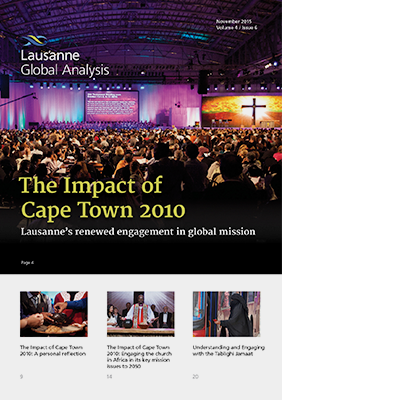Welcome to the November issue of Lausanne Global Analysis. We look forward to your feedback on it.
In this issue we focus in three of our articles on the impact and legacy—five years on—of the Third Lausanne Congress on World Evangelisation held in Cape Town in 2010. Our Executive Director/CEO Michael Oh and Director of Executive Projects Justin Schell analyse the fruit of the Congress, emphasising particularly taking a long view of the work of global mission; Michael’s predecessor Doug Birdsall, who organised Cape Town, offers his personal reflection on the conference’s legacies; and Rudolf Kabutz focuses on the impacts of it in Africa, as well as the key issues for Christians in Africa going forward. We also feature an analysis by Jenny Taylor of the highly influential, but poorly understood, international Muslim group Tablighi Jamaat and the challenge it poses to mission thinkers.
‘During our 40th anniversary year, the Lausanne leadership prayerfully produced a fresh articulation of what we hope to communicate as our vision for engaging in global mission in the next 40 years’, write Michael Oh and Justin Schell. This is some of the fruit from Cape Town. The value of any gathering lies primarily in its resultant impact—the enduring worth. The low-hanging fruit was the potential to collaborate on the more than 30 critical issues that were identified as crucial for the global church to engage in mission and to strengthen and renew regional networks. However, Cape Town also reminded us of the desperate need to take a long view in the work of global mission. Lausanne will have a unique role in helping to identify and empower younger leaders, through the third global Younger Leaders Gathering (YLG) and Younger Leaders Generation (YLGen), and in fostering a greater partnership in global mission. ‘We have much to be thankful for. However, there also remains much to do’, they conclude.
‘There were many challenges on the way to Cape Town’, writes Doug Birdsall. However, the organising group was carried along by the Holy Spirit, and there was a sense of calling, and God’s confirmations. The Congress created an ongoing point of reference and identification. It has become a trusted way to recognize or reference a person as a significant thinker or leader. Furthermore, many organisations have begun or renewed using The Lausanne Covenant as their statement of faith. There are numerous stories since of initiatives that were started at Cape Town, whether through encounters at a table group or just the spontaneity of people being together. Indeed these completely unplanned encounters have led to some very significant ministries. This is one of the most important legacies of Cape Town. ‘It gives me great satisfaction that now, five years after the event, there is such vitality in the Movement’, he concludes.
‘Leaders are wise to take time regularly to focus on identifying and understanding the key issues for the global role of the church’, writes Rudolf Kabutz (future media strategist at TWR). Cape Town 2010 was such a time of identifying and processing these critical issues for people on the hosting continent of Africa. The impact of Cape Town in Africa can be seen five years later through growing collaboration between the media and Christian leaders to speak into the key issues of the day together. For the next 35 years there is the opportunity to reach the greatest ever number of African youth with the love of Christ. This great strategic opportunity can easily be missed. ‘Identifying and moving with the key issues can enable Christians in Africa and beyond to work closely together in order to live out the life that Jesus demonstrated for his disciples to follow’, he concludes.
‘The Tablighi Jamaat (TJ) is the most successful of the many neo-fundamentalist groups to form after the Indian Mutiny (or Uprising) in 1857 and yet very few Christians even know about them’, writes Jenny Taylor (CEO of Lapido Media). Eighty-million strong today and established in 150 countries, they have for 20 years been trying unsuccessfully to establish a ‘mega mosque’ in Newham, east London. They are only ever referred to in newspaper stories of jihadis or terror plotters who may have attended one of their mosques. Christians in particular need to acknowledge the spiritual hunger of a people out of love with the world, yearning for spiritual consolations, and sometimes a more heroic role. Mission thinkers need to understand TJ’s appeal. That means actively reaching out to TJ Muslims with our own radical critique of a fallen world. Some Christian partnership projects are alert to this. ‘[Such a] model, which decisively ends isolation and encourages practical activity in partnership, is surely replicable around the world’, she concludes.
Whether you are planning to read the full articles or just the executive summaries, we hope that you find this issue stimulating and useful. Our aim is to deliver strategic and credible analysis, information, and insight so that as an influencer you will be better equipped for the task of global mission. It’s our desire that the analysis of current and future trends and developments will help you and your team make better decisions about the stewardship of all that God has entrusted to your care.
Please send any questions and comments about this issue to analysis@lausanne.org. The next issue of Lausanne Global Analysis will be released in January.

